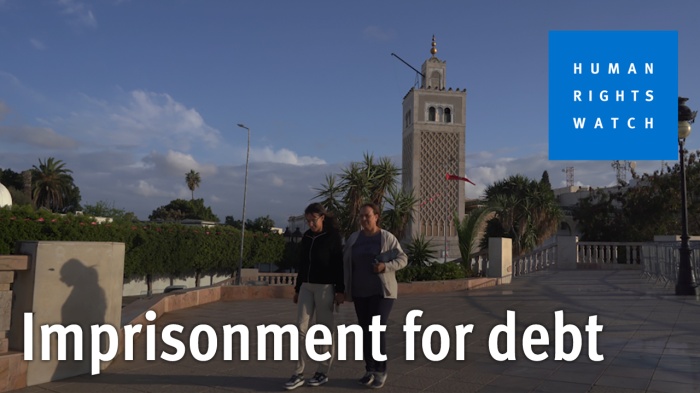Tunisia: Many Face Prison Over Debts
Read a text description of this video
202311MENA_Tunisia_Debt_Imprisonment
Feature Script:
SOUNDBITE: Jalia Hedhil [Mejid’s wife]
Mejid is a person I can't describe, he's got a great personality and a very big heart. Mejid was arrested in 2015 for writing bounced checks. The hardships of [prison] deeply impacted him, and he is no longer the strong person he once was.
SOUNDBITE: Siwar Hedhil [Mejid’s daughter]
We were always together, my childhood memories are filled with moments spent with him. Then of course when he went to prison, things were no longer the same. We write poems and stories to each other. I realized that I could express my pain in an artistic way. This helped me break out of the isolation and depression I was feeling.
SOUNDBITE: Jalia Hedhil [Mejid’s wife]
Siwar was her Daddy’s girl and still is. They were inseparable.
VO:
Mejid Hedhil is a former contractor who had a construction business. In 2010 he was hired by a Tunisian Ministry to renovate a building in the Kasbah quarter of Tunis, where several government ministries are located.
SOUNDBITE: Jalia Hedhil [Mejid’s wife]
Our life was very good and we suddenly hit rock bottom.
VO:
Things began to change for Mejid’s business at the beginning of 2011. Mejid had to cease operations on site due to the protests in the Kasbah quarter of Tunis.
SOUNDBITE: Jalia Hedhil [Mejid’s wife]
Suppliers quickly learned that Mejid was facing financial difficulties, prompting them to cash their checks simultaneously. The situation caused Mejid to struggle significantly.
VO:
Acquiring goods from a supplier in exchange for a check to be cashed later is a widespread practice in
the Tunisian commercial sector. It means business owners like Mejid can carry out commercial transactions at a given time, even if they are unable to pay for the goods or services right away.
VO:
Under this practice, a supplier provides a merchant with an informal loan secured by a check that they commit to cash at a later stage rather than immediately. This is a widely used business model,
popular in particular with small enterprises.
SOUNDBITE: Siwar Hedhil [Mejid’s daughter]
Checks play a crucial role in driving the economy forward.
SOUNDBITE: Jalia Hedhil [Mejid’s wife]
We were waiting for a partial payment of 400,000 dinars (119,000 euros)...
SOUNDBITE: Jalia Hedhil [Mejid’s wife]
...[with that money] we could have covered checks and paid suppliers.
SOUNDBITE: Jalia Hedhil [Mejid’s wife]
If he had been paid, Mejid would have been able to settle his debt.
SOUNDBITE: Jalia Hedhil [Mejid’s wife]
When Mejid was arrested, our situation was unstable and I couldn’t afford a lawyer. This financial strain significantly impacted Mejid’s defense.
SOUNDBITE: Siwar Hedhil [Mejid’s daughter]
Now, he has been in jail for nearly 10 years. The checks law is unfair.
VO:
According to the government, 496 people are currently in detention due to failed checks, nearly all of whom were entrepreneurs. How can you take steps to repay if you’re in jail?
VO:
Tough economic times have only aggravated the problem. Today, Tunisia is still in the midst
of a severe economic crisis, with significant inflation, a lack of liquidity and heavy foreign debt. This impacts smaller businesses more than most.
SOUNDBITE: Jalia Hedhil [Mejid’s wife]
Society judges you badly based on appearances, without understanding the full truth of a situation.
SOUNDBITE: Jalia Hedhil [Mejid’s wife]
I hope the president will address bounced check issues and help families reunite. Words can't fully describe the catastrophic situation.
VO:
Imprisonment solely for owing debt is a violation of international human rights law. Not only it deprives indebted people of their freedom, it impacts their physical and mental health, but also harms their families who face stigma, and whose living conditions deteriorate
as a result of the imprisonment.
SOUNDBITE: Siwar Hedhil [Mejid’s daughter]
When my dad went to prison, money became a real problem. We struggled to afford our basic needs
and sometimes went days without food.
SOUNDBITE: Siwar Hedhil [Mejid’s daughter]
[The government] promised that he'll be pardoned and freed, pledged reform, said he'll get paid.
VO:
The authorities need to assess each case individually, and release those imprisoned who are unable to pay their debts, allow their rehabilitation, and support them in a planfor settling their debts.
SOUNDBITE: Siwar Hedhil [Mejid’s daughter]
I hope the law will be revised, and better solutions will be implemented, because imprisonment isn't a solution.
SOUNDBITE: Siwar Hedhil [Mejid’s daughter]
I hope my dad leaves prison and the truth comes to light. So that we can spend time with him, and share some precious moments together.
At least several hundred people are in prison in Tunisia solely for writing checks they were later unable to pay. Many others facing charges are in hiding or exile. The practice amounts to debt imprisonment, which destroys families and businesses, and violates international law. Tunisia should replace this system with alternatives to prison for repaying debt; debtors should be released and allowed to establish a repayment plan.
The film focuses on Mejid Hedhil's story of being imprisoned for unpaid debts. Mejid is currently serving a 120 year sentence, the film focuses on how this has affected his family, with interviews from his wife and daughter.
